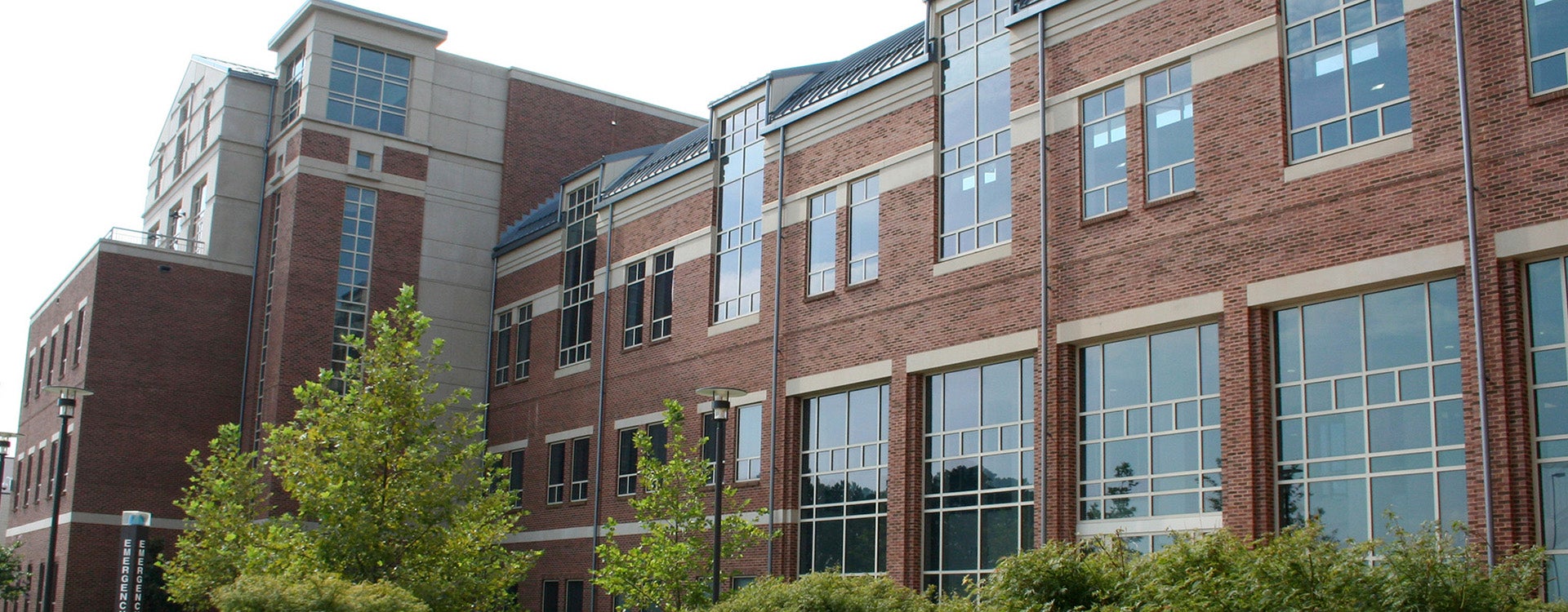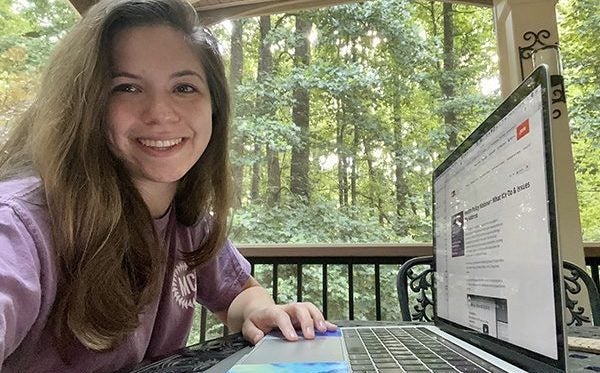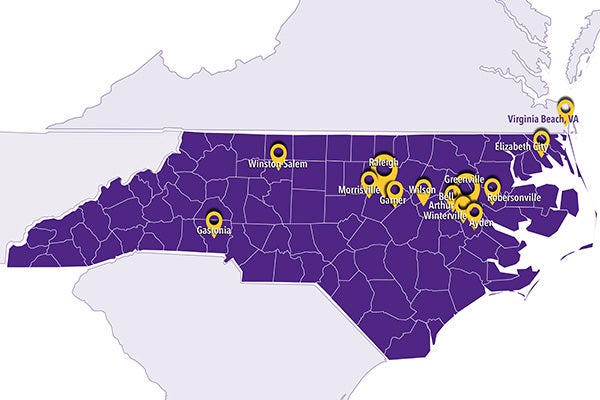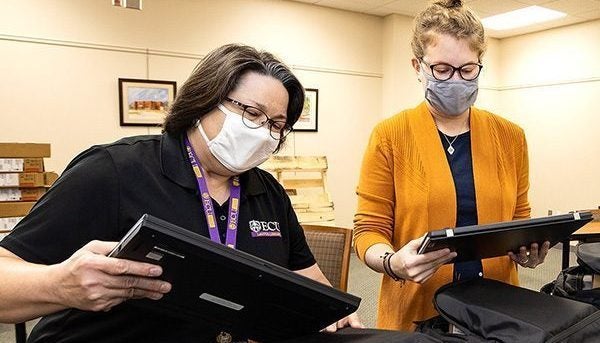Laupus Health Sciences Library celebrates National Library Week
Since the COVID-19 pandemic began, Laupus Health Sciences Library has created new and innovative ways to serve the Division of Health Sciences and members of the community by ensuring access to information and resources.
Now, the spotlight shines on Laupus and other libraries that have gone above and beyond even during uncertain times.

Laupus Health Sciences Library is located on the Health Sciences Campus. (Photo by Gretch Baugh)
April 4-10, 2021 is National Library Week, a time to highlight the essential role libraries, librarians and library workers play in transforming lives and strengthening communities.
The theme for this year’s National Library Week is “Welcome to Your Library,” which promotes the idea that libraries extend far beyond the four walls of a building and that everyone is welcome to use their services. Whether people visit virtually or in person, libraries are accessible and inclusive places that foster a sense of belonging and community through learning, discovery and exploration.
“National Library Week makes me reflect on the value of the Laupus Library to the Division of Health Sciences, and particularly how the library employees and I can continue to support and partner with our colleagues in the health sciences in new and innovative ways,” said Laupus Director Beth Ketterman. “The level of creative thinking we’ve engaged in to meet needs when our doors were shut for so long is a reflection of the spirit and professionalism of our team, and I’m so proud of that this year.”
First sponsored in 1958, National Library Week is a national observance sponsored by the American Library Association and libraries of all types—from public to academic—across the country each April.
The week also honors those who work in libraries for their ingenuity and spirit.
Visit this video on YouTube for closed captioning.
April 6, 2021 is National Library Workers Day, a time to recognize library professionals for their expertise and leadership skills in transforming lives and communities through education and lifelong learning. The day also reminds the public that library workers serve as community compasses that lead users to endless opportunities for engagement, enrichment and development.
During the past year, Laupus offered a variety of programs that connected campus even while classrooms went virtual and technology needs shifted—at the same time as adjusting to its own changes.

Torri Penna, a master’s student in occupational therapy, said the Laupus hotspot loan offering provided a stress-free connection to her online courses. (Contributed photo)
“Laupus pivoted like the rest of the DHS in March 2020. Our services shifted online and our partnerships with researchers and students continued at a distance to ensure their continued success at a time of great uncertainty,” Ketterman said. “We’re still doing our work remotely to the extent possible, and from this we’ve learned that librarians are great connectors of people to health information through technology and creative problem solving at a distance.”
Through grants and initiatives, Laupus Library’s team of professionals worked to help students, faculty and staff maintain connectivity with technology when the pandemic led to many of them working and learning from other locations. Library professionals continue to fulfill the research, service and informational needs of the health sciences community. Laupus librarians and other staff have contributed to collaborative efforts across the division to ensure access to resources for faculty and students. They were also embedded in online courses for an additional point of contact.
With support from the Medical & Health Sciences Foundation, Laupus Library was able to purchase additional e-books for distance-learning curriculum and clinical information resources related to infectious diseases. E-book access will help students, faculty and clinicians continue learning without having to borrow print materials onsite. The library also received funds for WiFi hotspots that can be loaned out to students who need to access the internet from home or other remote learning sites. The hotspots are available through the library’s equipment loan program which also includes laptops, cameras, charging cords and other items that can be picked up curbside.
As an anchor of information and resources for the Health Sciences Campus, Laupus Library sponsored a virtual roundtable discussion through its Diversity Committee titled, “Minority, Public and Rural Health Disparities” in October. Panelists included Dr. Eric Bailey, professor of public health and anthropology; Dr. Ronny Bell, chair and professor of the Department of Public Health; and Dr. Karlene Cunningham, clinical assistant professor in psychiatry and behavioral medicine.

Throughout the COVID-19 pandemic, Laupus Library loaned laptops to ECU students located in North Carolina and Virginia with their expanded equipment loan program. (Contributed graphic)
Laupus employees also worked to fill technology gaps for those in need of resources in the community.
The library was awarded a $75,000 grant through the Institute of Museum and Library Services to provide laptops and health education instruction to the school-aged children of migrant farmworker families in eastern North Carolina.
The library purchased 100 laptops to be distributed in November to middle- and high-school children in Wayne and Pitt counties. Beth Ketterman, Laupus Library director, said laptops were chosen as the device to best meet the needs of these students. The project dovetails a previous grant coordinated by Dr. Joseph Lee, from the Department of Health Education and Promotion in the College of Health and Human Performance, which provided hotspot internet connectivity for these same migrant communities.
“The shift to remote instruction upended education in the greatest of ways,” said Ketterman. “Providing a device that is not just loaned but given to a student who has the added challenge of potentially moving during the pandemic, means they can have a consistency in access to their learning materials.”
In February, Laupus celebrated Love Data Week with virtual presentations and events. Love Data Week is an international event intended to engage researchers in dialogues around issues and methods in data creation, analysis, and visualization. Federal funding sources and private foundations are becoming more focused on the rigor and results of research, and data is more important than ever. From managing data to learning about the process of gathering information and applying data, Love Data Week’s virtual conversations will highlight resources, tools and training related to data and its issues and trends.
The week’s highlights included presentations from Laupus Library and the Office for Faculty Excellence as well as faculty from the School of Dental Medicine, College of Allied Health Sciences and the Brody School of Medicine. Presentations covered topics from data collection and analysis to conducting research as part of a productive team.

Mary Roby, left, and Jamie Bloss prepare laptops for distribution at Laupus Library. (Photo by Rhett Butler)
Laupus Health Sciences Library’s Diversity Committee hosted a virtual roundtable on March 10, called “Coping through the COVID-19 Pandemic: Diverse Experiences.” Featured panelists included faculty from Brody’s Department of Psychiatry and Behavioral Medicine. The library has hosted additional virtual events during the pandemic to connect the campus community with experts and resources who offered solutions and collaboration to a variety of health care and educational challenges brought about by the pandemic.
Ketterman said Laupus leaders and employees have learned not only how to provide information in new ways, but also to use their own strengths to open doors to resources for others.
“I think our library workers will all come away with a sense of resiliency,” she said, “that if we can get through this pandemic still leading the way for the DHS in evidence-based information access, we can find a way to get through pretty much anything.”